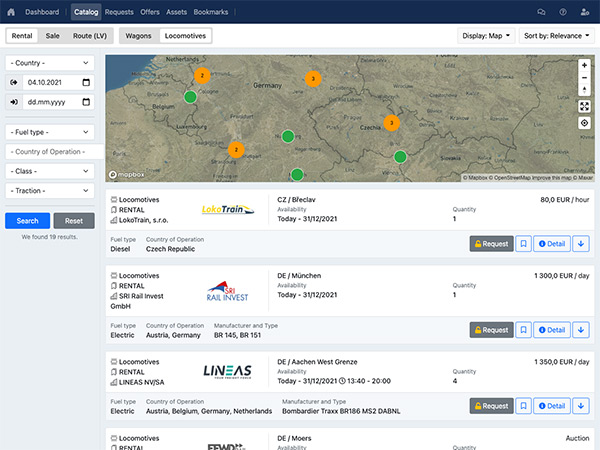RM: How has the war in Ukraine and the subsequent sanctions affected intermodal rail traffic from your point of view?
Jiri Chladek, Managing Director of Rohlig Suus Logistics for the Czech Republic and Slovakia: The war in Ukraine has significantly changed the existing global supply chains. The hitherto standard transport routes between the East and the West have been disrupted. As an industry, we had to learn to function in this new reality. The war also caused an energy crisis in Europe, which also affected the functioning of intermodal transport. From one day to the next, coal transport had to move to tracks that had not been transported so far, bypassing, for example, closed Ukrainian ports. For this reason, we faced bottlenecks and congestion. Transport on the New Silk Road also suffered, as some customers withdrew from this direction.
At Rohlig Suus Logistics, we have been focusing on diversification for many years – both in terms of geography, industries served, and means of transport and services offered. We believe that only in this way we are able to build a business resistant to market turbulence. The experience of the Covid-19 pandemic and the war in Ukraine confirmed this belief.
RM: Are there any workable rail routes from Asia that bypass Russia? What is your experience?
Jiri Chladek, Managing Director of Rohlig Suus Logistics for the Czech Republic and Slovakia: Logistics operators can use the Trans-Caspian Railway, which runs from China, through Kazakhstan, the Caspian Sea, Azerbaijan, Georgia, the Black Sea and Romania or Turkey. Unfortunately, this route is not infrastructural prepared to handle large volumes. As a result, the transit time is not much shorter than sea transport and the cost is far too high to be a competitive offer.
RM: The energy crisis has had a major impact on electricity prices, how has this factor affected intermodal transport?
Jiri Chladek, Managing Director of Rohlig Suus Logistics for the Czech Republic and Slovakia: Increases in energy prices translated automatically into higher rail transport costs. On the domestic market, we had to face increases of up to about 30%. The only direction where no significant cost changes were recorded is the New Silk Road. Dynamically growing transport costs may sometimes discourage customers from choosing this means of transport. However, we must remember that well-planned intermodal transport can be not only cheaper, but also faster and more ecological than other options. This can be achieved by e.g. use of road transport only for the first or last mile. Moreover, last year we also observed an increase in fuel prices, which had an impact on the decrease of attractiveness of road transport in the context of costs. Furthermore, in intermodal transport, we use one load unit – a container or an intermodal semi-trailer. Therefore, we avoid reloading costs and minimize the risk of damage to the goods. Even apart from the recent increase in energy costs, well-designed intermodal freight can be more cost-effective.
RM: Are you still considering rail transport because of the energy crisis?
Jiri Chladek, Managing Director of Rohlig Suus Logistics for the Czech Republic and Slovakia: Intermodal transport is a rapidly growing segment of the market – more and more companies want to conduct their operations in a sustainable and pro-environmental manner, and intermodal freight can ensure this by reducing the negative impact of transport on the natural environment. At Rohlig Suus Logistics, we have customers who have chosen this method of transporting their goods for ecological reasons. Moreover, we must not forget that this means of transport with large volumes is also the most optimal cost solution.
The second part of the interview with Jiri Chladek, Managing Director of Rohlig Suus Logistics for the Czech Republic and Slovakia, will be published soon.

